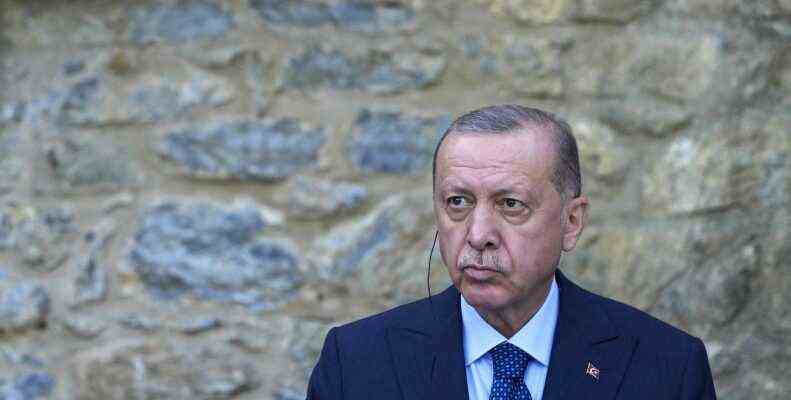Turkey risks an open conflict with Germany and other western partner states. In a drastic step, the Turkish head of state Recep Tayyip Erdoğan declared that he had given his foreign minister “orders” to declare the German ambassador and the diplomatic representatives of nine other states “undesirable persons”. This step is usually followed by the expulsion of the diplomats concerned by the host country or their prior withdrawal by their home countries.
The diplomatic scandal was preceded by an equally unusual step by the ten ambassadors themselves. In a joint statement on Monday they called for the release of the opposition cultural promoter Osman Kavala, who has been imprisoned without a court ruling since 2017. You had relied on the rulings of the European Court of Human Rights (ECHR). Turkey has to implement ECHR judgments as a member of the Council of Europe. Ankara then forbade the country’s rule of law and the independence of the courts from being called into question.
Erdoğan’s latest step will inevitably lead to a drastic deterioration in Turkey’s relations with Germany, but also with the other affected states. The head of state had also struck an extremely sharp tone. “I gave the order to our Foreign Minister. I said, see to it that these ten ambassadors come to us as soon as possible persona non grata to explain, “he said.
The diplomatic representatives of Germany, the USA, France, Canada, Finland, Denmark, the Netherlands, New Zealand, Norway and Sweden are affected. Erdoğan had previously threatened the ambassadors because of their statement on the Kavala case. “We cannot afford the luxury of welcoming them to our country,” said the president on Thursday.
Berlin has always tried not to let the relations escalate
Addressing the ten ambassadors, he said: “Is it your place to teach Turkey a lesson? Who are you?” Germany or the USA did not simply let “crooks, murderers and terrorists” go free, Erdoğan continued. He made a similar statement on Saturday in a speech in the provincial town of Eskişehir.
The entrepreneur and civil society active sponsor of culture Kavala has been charged with allegedly supporting an attempted coup against the government since 2017. He is charged with supporting the protests in Istanbul’s Gezi Park in 2013. The legal allegations are bizarre, also in the opinion of Turkish lawyers. Initially, Kavala was acquitted in 2019, but then the allegations were raised again and the allegation of political and military espionage in connection with the failed coup attempt in 2016 was added.
It is noticeable that Erdoğan’s actions offend his last supporters in Europe, especially Germany. Turkey has had serious political conflicts with the EU and the USA for years. Despite all the criticism in the background, Berlin has always tried not to let European relations with Ankara escalate. On Saturday a week ago, the outgoing Chancellor Angela Merkel made a farewell visit to Istanbul. Merkel and Erdoğan then made no secret of the differences of opinion, but nevertheless tried to create the impression of mutual appreciation and sustainable relationships.
With other partner states – be it in the EU or in NATO – the relationship has become much more difficult. The NATO state Turkey is at odds with Washington on numerous issues. There is the purchase of the Russian air defense system S-400who angered the USA as a leading NATO nation so much that it stopped Turkey building and buying the state-of-the-art fighter aircraft F-35 excluded. In addition, Ankara and Washington are arguing over the question of supporting the Syrian and Iraqi Kurds.
Erdoğan expects a tough stance from a possible new traffic light government
The conflict with the EU is about the sea borders in the eastern Mediterranean and the exploration and exploitation of natural gas deposits in these waters as well as the necessary pipelines and power lines. Turkey repeatedly comes into conflict with Greece and the Republic of Cyprus. She uses warships to protect her research vessels. Greece also repeatedly sends its fleet in this conflict. Berlin mediated this dispute.
At the same time, however, the EU must endeavor to maintain a stable relationship with Turkey over the long term because of the refugee issue. In order to control migration to the EU, Brussels has just extended the far-reaching refugee agreement with Ankara. Here, too, Chancellor Merkel was seen as a driving force. One possible explanation for Erdoğan’s harsh approach could therefore be that he expects a tougher stance from a new Berlin coalition government.
Erdoğan is likely to be pursuing domestic political goals above all: In the past few months, his support among the population has waned. The main reason is the increasingly poor economic situation. The ruling party AKP and its unofficial coalition partner, the right-wing MHP, no longer achieve a clear majority. Erdoğan himself can no longer be sure of success in presidential elections either. The course of confrontation he has now taken on foreign policy could distract the Turks from criticizing the miserable economic situation and force the opposition to take a “national line” and hold back criticizing the head of state.

